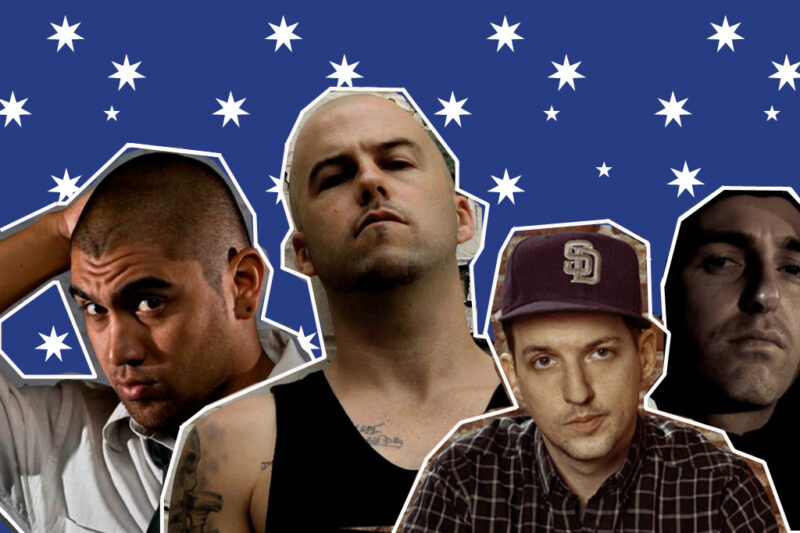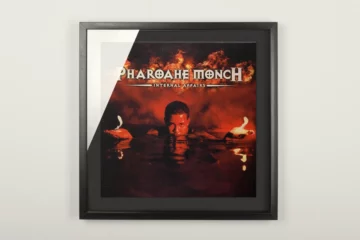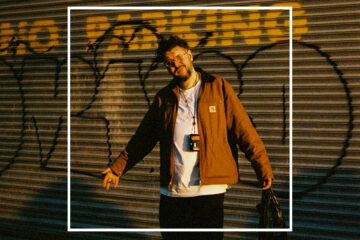Since the early 80s, Australia and Germany have both fostered a unique and thriving Hip-Hop culture that extends far beyond any form of weak American mimicry. In fact, long before the Internet revolution, German graffers have been traveling to Australia to further develop and evolve their style, to exchange ideas and techniques and most importantly, to drink beers, punch cones and bomb trains. Despite this strong old-skool connection, most Australian Hip-Hop (or Skip-Hop) remains as obscured and isolated as the continent that spawns it, with very few artists even attempting to export their sound. In recent times though, thanks to websites like Youtube and Soundcloud, there has been a significant increase of Aussie Hip-Hop heads embracing the technological revolution and using it to take on the world.
Within almost every country there are countless Hip-Hop splinter-cells and sub-genres. In fact, this kind of transcontinental »Hip-Hop Inception« has been incubating and evolving for more than 3 decades, so it really wouldn’t be a stretch to describe Gen Y as the first true Hip-Hop generation. Thanks to pioneers like Grand Master Flash, Afrika Bombatta and RUN-DMC our generation has had the luxury of growing up in a time when the foundations of Hip-Hop have already been well established and embraced by the world.
In 2003 the RZA set out on an ambitious mission to collaborate with a wide variety of non-English speaking MCs from all over the world in an attempt to give exposure to an increasingly globalized movement and to help unify the international Hip-Hop Community. In 2010 the RZA also made an appearance on the Platinum selling album »Running On Air« with Aussie Hip-Hop stalwarts Bliss n Eso – an Aussie rap duo that have also worked with renowned European artists like Jehst and performed some of the biggest music festivals in North America.
»We’re knocking down all barriers, and there’s no separation in Hip-Hop. We’re not going to say there’s West Coast or East Coast Hip-Hop, American Hip-Hop or European Hip-Hop—it’s got to be the movement of our generation, one Hip-Hop. I like to say this quote: ›Hip-hop: the sound and soul of our generation.‹« – The RZA
These days Hip-Hop is so widespread and diverse that it’s very possible for the underground to flourish, even in the shadow of massive pop stars like Kanye West with publicity budgets in the millions. Within Australia there are a plethora of independent rappers like Brad Strut, Omar Musa, Kerser and Tornts making a very decent living off CD and merchandise sales alone thanks to the loyalty of their fan base.
CITI:»Australia is a nation of cultural orphans struggling to come to terms with its own national identity. Perhaps this is one of the reasons so many young Australian’s choose Hip-Hop as a surrogate.«:### Authenticity is without question the most universally valued component within any Hip-Hop scene. Just like in Germany, Aussie rappers who take on an American accent are very quickly dismissed or mocked by the rest of the community. Self-expression without sincerity is worthless, especially in Hip-Hop. At the recent Australian Independent Music Awards, platinum selling pop rapper 360 confessed that »As an artist on a label that receives funding from a major label, I don’t feel right to be standing here at the Independent Music Awards, but the rules say my label qualifies so here I am… Artists like the Jezabels work their arses off gigging all year round and working around the clock to get where they are today. They don’t have the big machine helping them along like I do.« An admirable expression of honesty and another grim example of Major Labels masquerading as independent in order to boost an artist’s street cred, an international industry trend not just confined to Hip-Hop that has seen a countless number of legitimate grass-roots labels and artists go unnoticed.
Whilst 360 isn’t exactly Australia’s most well respected or liked MC, in recent times he has had a great deal of success over-seas simply because in Hip-Hop, money talks. Modern day Hip-Hop is a billion dollar industry and so it is no surprise that one of the most effective ways of procuring international attention is to have impressive record sales within your own country. Although once upon a time the music industry was built around the entrepreneurial spirit of risk taking, these days record labels only really care about minimizing fiscal risks and rehashing old ideas and formulas that have already been proven to work. This means that to succeed internationally, an artist needs to have already proved that they can not only shift units but also jump through the appropriate industry hoops to insure maximum financial returns.
Another more traditional path to international recognition (and one of the more immediate and extreme examples of Hip-Hop’s rapid globalization) is the ever-expanding international Battle Rap scene. Thanks to the ease and accessibility of Youtube, rappers from all corners of the Globe are able to get a genuine taste of each local Battle League and its unique regional flavor. There’s just something about the noble and seemingly ancient spirit of Battle Rap that transcends all races and religions. It has become a sacred Hip-Hop tradition that harkens back to the days of philosophers like Plato and Socrates, battling for intellectual supremacy. The brutal, gladiatorial premise of two highly skilled warriors battling for honor and respect in front of a bloodthirsty crowd is just so damn primeval and universally appealing, that its globalization was inevitable. The immortal concept of a rags to riches Hip-Hop fairy tale ensuring an infinite stream of hungry MC’s filled with a raging competitive spirit that forces constant evolution and expansion of the art form.
International guests have become a staple of popular Battle Leagues, with MC’s like 360, MANAZ ILL and Justice flying to all corners of the globe to exhibit their skills and take on the best of the best. Contrary to popular belief and despite being the birthplace of Hip-Hop, America’s Battle scene actually pales in comparison to many countries in Europe and South East Asia. In fact there are videos on ›FlipTop‹, a popular Filipino battle league, that have more than 12 million views. In 2005, underground Melbourne MC Justice made Hip-Hop history by becoming the first non-American to ever win a Scribble Jam, the significance of which should not be underestimated. Not only did this conclusively prove that Australian rappers could be taken seriously on an international scale, but that this prestigious title could be won by anyone with the ambition, skill and fortitude, regardless of their race or ethnic background.
Whilst in some cases the language barrier may at times inhibit the international appeal of localized Hip-Hop, DJ’s and producers experience no such restrictions. M-Phaze (AUS) and Suff Daddy (GER) have both experienced a large amount of international acclaim working with a diverse catalogue of rappers from Australia or Europe and even cracking the seemingly impenetrable American market. Perhaps this is the ultimate example of how truly globalized Hip-Hop has become, once more reaffirming that no one really cares what colour you are or where you’re from, at the end of the day, all that really matters is style, substance and originality. Having said that there are definitely Australian lyricists that are starting to make a name for themselves in non-English speaking countries. Aussie Hip-hop royalty The Hilltop Hoods have performed at countless European Festivals over the years including Hip-Hop Open Festival in Stuttgart, Frauenfeld and the Open Air Festival in Switzerland, proving that it really is possible to rock an Aussie-accent with pride and still perform at some of Europe’s biggest music festivals. Whilst lyricism may be the core focus of most contemporary Hip-Hop acts, music is a universal language and can be appreciated and enjoyed regardless of a person’s origin or dialect.
CITI:»so write this down in your black books and journals, Skip-Hop culture is eternal …«:### In order to gain a better understanding of Germany’s distinctive Hip-Hop flavor, I spoke to German producer Suff Daddy to discuss the intricacies of German Hip-Hop and the differences between the German and Aussie scenes: »In Germany there’s a huge scene of super modern, progressive electronic kind of Hip-Hop beats and there are so many sub-genres that I can’t even name.« In Australia there’s definitely a certain sonic aesthetic that a lot of producers gravitate towards, however there are also a lot of groups like The Avalanches and Hermitude that have managed to gain international recognition because they‘re not afraid to take creative risks and break away from the more traditional 90’s style boom-bap. Thanks to the ever-growing international popularity of instrumental producers like Madlib, J Dilla and Samiyam, the number of bedroom producers around the world has exploded. »Everyone is producing beats these days, but in Germany there is so much potential and it’s the right environment for them to get out there because there are so many parties where only instrumental beats get played.« One of the biggest names in beats at the moment, Flying Lotus, has been known to purposely tailor his sets to better reflect the specific style of the country or city he’s playing in. According to Suff, when performing in Berlin, Fly Lo usually performs at large techno clubs and plays his more atmospheric/house style tunes. Conversely when playing in Australia, Fly Lo brings along a live band and performs at much smaller venues with a larger focus on bread and butter beats and improvisation.
One of the biggest barriers facing Australian DJs and producers is the exceptionally difficult task of crate digging. Not only is second hand Vinyl considerably more expensive over here than almost anywhere else in the world, but also thanks to Australia’s early obsession with Rock N Roll, decent Jazz/Soul/Funk records are extremely difficult to get a hold of. It’s set backs like this however, which encourage innovation; Aussie producers have been forced to think outside the box and experiment with other genres. On the other hand, artist like Miles Davis, Dexter Gordon and even Jimi Hendrix were massive in Europe long before they ever experienced any commercial success within the USA, ensuring that European vinyl junkies have an endless supply of cheap records ripe for sample harvesting.
In many respects, Australia is a nation of cultural orphans struggling to come to terms with its own national identity. Perhaps this is one of the reasons so many young Australian’s choose Hip-Hop as a surrogate. Whilst Australia is still trying to find exactly where it fits within the ever-expanding Hip-Hop universe one thing is certain; Oz Hip-Hop is a dynamic and essential part of the global Hip-Hop community »so write this down in your black books and journals, Skip-Hop culture is eternal …«.
GTNA Best Of Both Worlds – 360 vs Kerser:
Tim Kent is a writer and social worker from Sydney. He has been watching the Hip Hop scene in Australia and New Zealand for many years and is part of scene now too with his own projects









